Research at the Department of Electronic Systems
Research
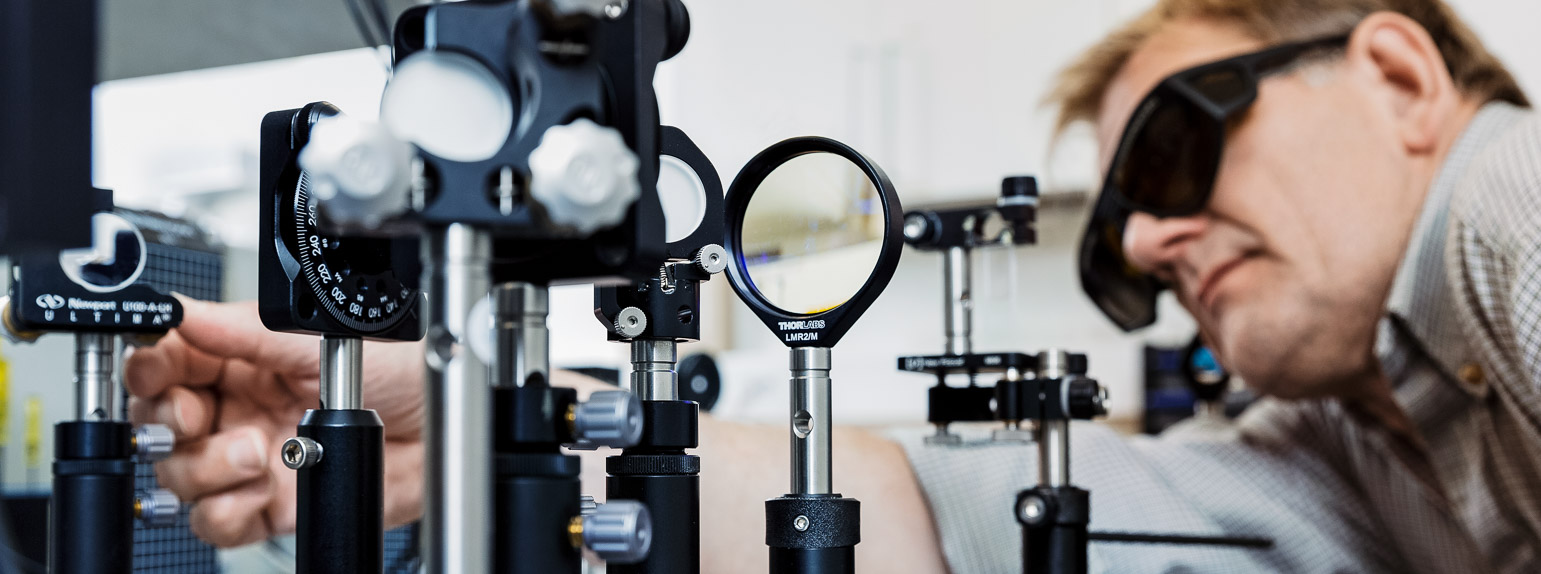
The department's research covers microsystems like micro lasers, micro electronics, integrated optoelectronics and waveguides. Our newest field of research is Nanotechnology, where the dimensions are at atomic levels.
Our research also covers wireless technology in communication, navigation, radar and remote sensing.
With today's demands on information quantity, transmission and storage must be made as effective as possible. Signal- and image processing, speech technology, music technology and communication are also areas of our research.
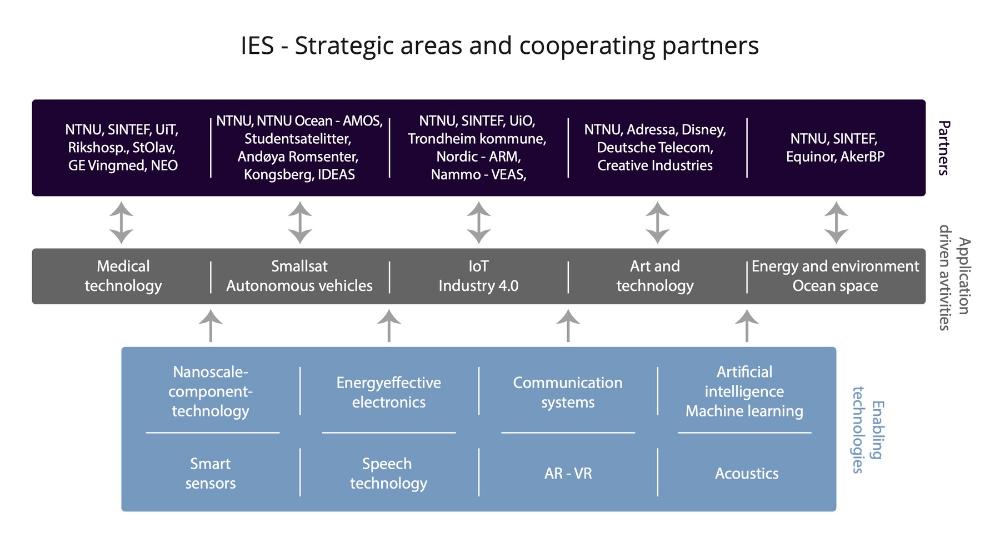
Research Groups
Acoustics
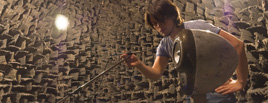 The acoustics group studies the generation, propagation, and reception of sound waves, as well as transducers and related signal processing, in a wide range of scenarios: sound for the communication between humans; the influence of sound on humans and animals; and technical uses such as remote sensing and underwater communication networks.
The acoustics group studies the generation, propagation, and reception of sound waves, as well as transducers and related signal processing, in a wide range of scenarios: sound for the communication between humans; the influence of sound on humans and animals; and technical uses such as remote sensing and underwater communication networks.
Circuit and Radio Systems

The Circuit and Radio Systems group performs research on design, modeling, verification, and testing of individual electronic circuits and larger systems. These can be used, e.g., for radio communication, for embedded control of automotive and household equipment, for health and well-being, and for microprocessors and general computing systems.
Nanoelectronics and Photonics
 Focus is on developing novel materials and techniques with improved functionality and reduced energy consumption.
Focus is on developing novel materials and techniques with improved functionality and reduced energy consumption.
The research group develops nanoscale materials with tuneable properties, photonic sensors, and optical characterization techniques for biomedical and information technology applications.
The group performs research on oxide electronics, semiconductor nanowires, periodic structures, photonic (bio)sensors, biomedical optics, and terahertz spectroscopy.
Signal Processing
 Signal processing, statistical signal theory, information and communication theory are the main academic topics that unite the activities within the group.
Signal processing, statistical signal theory, information and communication theory are the main academic topics that unite the activities within the group.
Smart Wireless Systems (SWS)
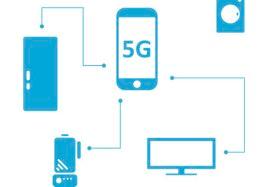
Research projects
Centres for Research-based Innovation (SFI)
| SFI CGF | SFI Centre for Geophysical Forecasting | Martin Landrø |
EU projects
| Project | Description | Framework | Contact |
|---|---|---|---|
| B-CRATOS | Wireless Brain-Connect Interface to Machines | H2020 2021 – 2025 |
Ilangko Balasingham |
| GLADIATOR | Co-Principle Investigator of Next-Generation Theranostics of Brain Pathologies With Autonomous Externally Controllable Nanonetworks: A Transdisciplinary Approach With Bio-Nanodevices Interfaces | H2020 2019 – 2022 |
Ilangko Balasingham |
| +CityxChange | Positive city exchange is a smart city project | H2020 2018 – 2023 |
Andrew Perkis |
| SOCRATES | Self-Organizing Computational Substrates | H2020 2017 – 2022 |
Erik Folven |
| NAGRALED | Semiconductor nanowire/graphene hybrids for high-efficiency light emitting diodes | H2020 2016 – 2019 |
Helge Weman |
| TULIPP | Towards Ubiquitous Low-power Image Processing Platforms | H2020 2016 – 2019 |
Per Gunnar Kjeldsberg |
| Immersive and Interactive Real Time 3D Social Media Graphics Environments for the Broadcast Industry - Visual media | H2020 2016 – 2019 |
Andrew Perkis | |
| WiBec | Wireless In-Body Environment Communications | H2020 2016 – 2019 |
Kimmo Kansanen |
| READEX | Runtime Exploitation of Application Dynamism for Energy-efficient eXascale computing | H2020 2015 – 2019 |
Per Gunnar Kjeldsberg |
| QoE-Net | Innovative Quality Of Experience maNagament in Emerging mulTimedia services | H2020 2015 – 2019 |
Andrew Perkis |
Norwegian projects
| Abbreviation | Project | Framework | Contact |
|---|---|---|---|
| ARIEL | Real-Time Remote Hyperspectral Imaging on Aerial Vehicles and Small Satellites | NFR 2022 – 2029 |
Milica Orlandic |
| Spin-based Intermittent Computer | NFR 2022 – 2027 |
Erik Folven | |
| Middle Atlantic Ridge Study with Three-Dimensional Magnetotelluric novel Techniques | NFR 2021 – 2026 |
Shunguo Wang | |
| UV-Nanolaser | Ultraviolet nanowire/graphene laser | NFR 2021 – 2027 |
Helge Weman |
| SCRIBE | Machine transcription of Norwegian conversational speech | NFR 2021 – 2025 |
Giampiero Salvi |
| Internet of Bio-NanoThings for Prediction and Prevention of Infectious Diseases | NFR 2020 – 2025 |
Ilangko Balasingham | |
| EMPOWER | High Efficiency Micro-electromagnetic Energy Harvesting System for Self-powered Smart Environment | NFR 2020 – 2023 |
Cuong Phu Le |
| Integrated III-V Semiconductor Frequency Comb on a Chip | NFR 2020 – 2023 |
Dingding Ren | |
| COPS | Comprehensive privacy and security for resilient CPS/IoT | NFR 2019 – 2024 |
Stefan Werner |
| CIRCLE | Communication Theoretical Foundation of Wireless Nanonetworks | NFR 2019 – 2024 |
Ilangko Balasingham |
| GAMES | Geophysics and Applied Mathematics for Exploration and Safe Production | NFR 2019 – 2024 |
Martin Landrø |
| RIOT | Resource-aware IoT with Enhanced Intelligence and Security | NFR 2018 – 2023 |
Stefan Werner |
| WINNOW | Wireless In-body Sensor and Actuator Networks | NFR 2017 – 2023 |
Ilangko Balasingham |
| ReRaNP | Reconfigurable Radio Network Platform | NFR 2015 – 2023 |
Torbjörn Ekman |
| CIUS | Centre for Innovative Ultrasound Solutions | NFR 2015 – 2024 |
Trond Ytterdal |
Other
| Project | Description | Framework | Contact |
|---|---|---|---|
| IoT over satellite for remote areas | Norsk Romsenter 2019 – 2019 |
Roger Birkeland | |
| aFerry | An integrated autonomy system for on-demand, all-electric and autonomous passenger ferries | FORNY2020 2019 – 2020 |
Egil Eide |
| 5G Pilot in Trondheim | Telenor ASA 2018 – 2019 |
Kimmo Kansanen |
Strategic Research Areas at the IE faculty
| Energy Efficient Computing Systems (EECS) | Per Gunnar Kjeldsberg |
Publications
Cristin (Current Research Information system) is a nationwide database system for research results and documentation.
- All publications from the department in Cristin
- PhD dissertations in Cristin
- PhD dissertations in NTNU Open
Infrastructure

The department has access to a broad spectrum of advanced laboratories and scientific equipment.
PhD Studies
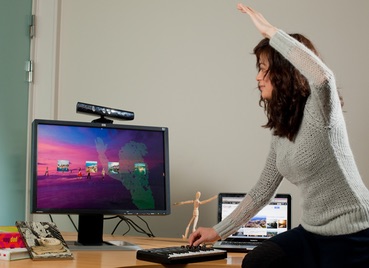 Supervised doctorates are the highest degrees awarded by the University for research. The research is carried out under the immediate supervision of staff members. The education and training provided produce graduates who have the capacity to conduct independent research that is both original and of high international quality.
Supervised doctorates are the highest degrees awarded by the University for research. The research is carried out under the immediate supervision of staff members. The education and training provided produce graduates who have the capacity to conduct independent research that is both original and of high international quality.
